Search the Special Collections and Archives Portal
Search Results

Letter from William Reinhardt (Los Angeles) to A. E. Stoddard, January 30, 1953
Date
Archival Collection
Description
If the bond issue failed, the public might try and force the railroad to increase water production, so the company should consider transferring all water production to the Las Vegas Land and Water Company who was in a better position to resist "unreasonable demands." "Copy" and "80-12" written in red pencil. Letter has several date stamps: E.E.B., E.C.R. and U.P. R.R. Co., Los Angeles.
Text

Letter from William Reinhardt (Los Angeles) to A. E. Stoddard, September 30, 1952
Date
Archival Collection
Description
Discussion of strategy to resist the railroad being forced to spend money to increase water production; Letter has date stamps from E.E.B., E.C.R. and U.P. R.R. Law Department, Los Angeles. "80-12" is written in red pencil in top right corner.
Text
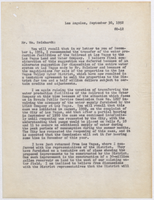
Letter from E. E. Bennett (Los Angeles) to William Reinhardt, September 30, 1952
Date
Archival Collection
Description
The ability of the railroad to resist demands to increase water production would be aided if water production facilities were solely in the possession of the Las Vegas Land and Water Company
Text

Memo from Edward C. Renwick to E. E. Bennett about the Las Vegas Land and Water Company being required to augment its water supply, 1952
Date
Archival Collection
Description
Discussion of the relevant legal issues and court decisions relating to the question of whether the railroad could be forced to increase water production
Text
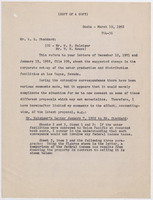
Letter from R. M. Sutton (Omaha) to A. E. Stoddard, March 19, 1952
Date
Archival Collection
Description
Comparison of the economic benefit of selling water production and distribution facilities in Las Vegas to the Water District versus donating them.
Text
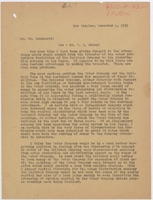
Letter from E. E. Bennett (Los Angeles) to William Reinhardt, December 4, 1951
Date
Archival Collection
Description
Detailed discussion of the UP divesting itself of water production facilities to the Las Vegas Land and Water Company. Written in red pencil at the top of the page: "4705-11-22" and "80-Gen."
Text
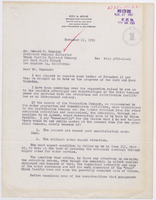
Letter from Roy A. Wehe (San Francisco) to Edward C. Renwick (Los Angeles), November 23, 1951
Date
Archival Collection
Description
If the Union Pacific should divest itself of water production to the Las Vegas Land and Water Company, Wehe describes what the operation of the company should look like. Letter has several date stamps, including one from E. E. Bennett and one from the Union Pacific Railroad Law Department.
Text
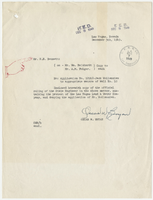
Memo from Oscar W. Bryan to E. E. Bennett about the water appropriation ruling, December 5, 1949
Date
Archival Collection
Description
Attorney Oscar W. Bryan referring to the state engineer's denial of Jack Wollenzein's application to drill a well. The official ruling is referenced below.
Text

Telegram from G. A. Cunningham (Salt Lake City) to V. W. Smith (Los Angeles) and C. C. Larkin (Salt Lake City), May 4, 1959
Date
Archival Collection
Description
The water district waived the restriction on the railroad furnishing Las Vegas residents from their shop well until they had the capacity to do so themselves, and Cunningham advised that this arrangement continue as long as needed.
Text

Telegram from Edward C. Renwick (Los Angeles) to G. A. Cunningham (Salt Lake City), April 30, 1959
Date
Archival Collection
Description
The Water District advised that they did not have the facilities to supply enough water to Las Vegas and would not object to the Union Pacific Railroad providing water from its shop well.
Text
